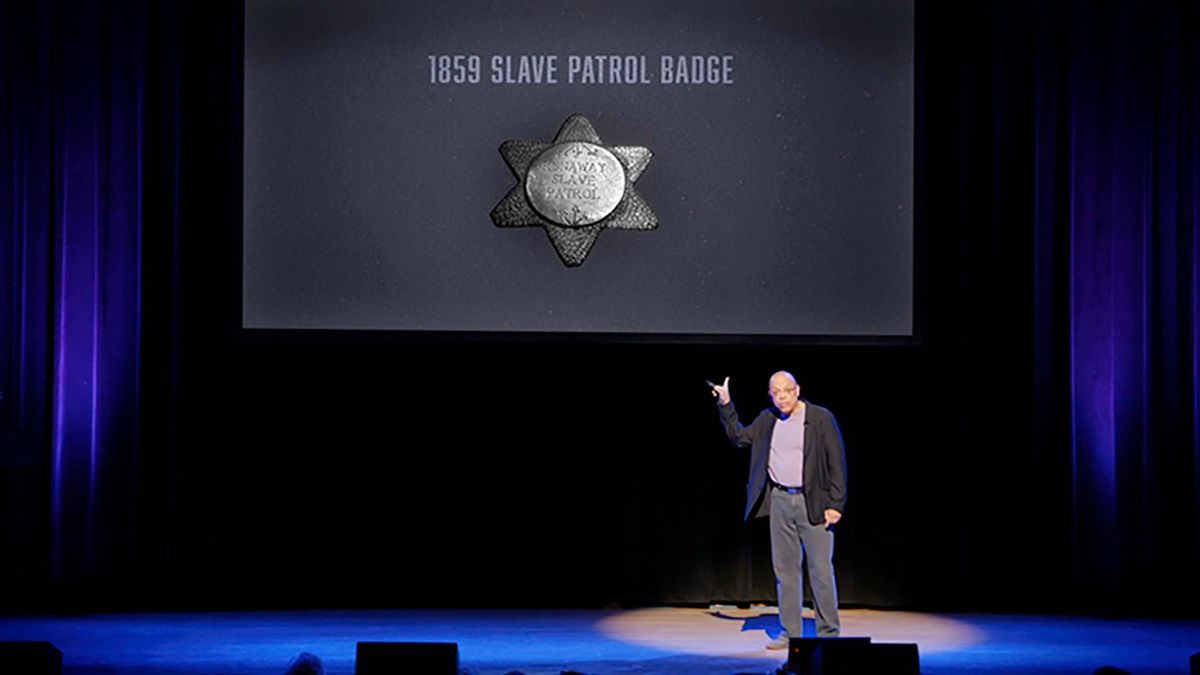Review: ‘Who We Are,’ a documentary history of racism, holds a mirror up to America

At the top of the excellent documentary “Who We Are: A Chronicle of Racism in America,” we hear a solicitation put to a 2018 audience at New York City’s Town Hall theater by the evening’s host, attorney Jeffery Robinson, former ACLU deputy legal director: “If you have ever owned a slave, please raise your hand.”
And then, when no hands go up, Robinson, who since 2011 has been delivering some version of this talk – akin to a PowerPoint presentation on racism complete with audiovisual clips – explains the point of asking what sounds like a rhetorical question but isn’t.
“Slavery is not our fault,” he says. “We didn’t do it. We didn’t cause it. It’s not our responsibility.” But it is, he adds, our shared history, and when we try to turn that shared history into something that it’s not – “when we try to make more light of it than it was, then we are denying who we really are.”
That last phrase echoes through the film, giving it its title and cropping up again at moments such as when Robinson shows a photo of the mutilated face of the murdered Black teenager Emmett Till. He suggests that the decision of Till’s mother, in 1955, to share that horrific image with the media was in some ways like holding a mirror up to America.
“Ignorance is not bliss,” Robinson says late in the film “because it allows a false history to thrive.” Evidence of this is made plain as we watch Robinson rebut the arguments of a white man holding a Confederate flag on the sidewalk as he insists that the Civil War was solely about economics, not slavery.
Also interspersed amid footage of Robinson’s stage presentation, in a way that evokes memories of the climate-change documentary “An Inconvenient Truth,” are other interviews that take Robinson out of the theater.
We see him pay visits to institutions such as Charleston’s Old Slave Mart Museum and the site of the 1947 murder of Elmore Bolling, a Black Alabama businessman who is said to have been lynched because he was too successful.
The combined impact of these scenes, augmented with Robinson’s lecture – which, while deeply informed and informative, is anything but dull or academic – makes for a powerful one-two punch. “Who We Are” follows a rough chronology, from the founding of this country to today.
Along the way, Robinson identifies what he called several tipping points, where it looked like things were getting better only to backslide: the end of the Civil War and Reconstruction, followed by decades of policies that restricted formerly enslaved people; the mid-20th-century rise of the Civil Rights era (culminating in the 1968 assassination of Martin Luther King Jr.); and the ongoing racial reckoning movement that has been taking place across America over the past few years.
A graphic animation of a boulder-like form rolling up a hill, as if by Sisyphus, and then rolling back down before it clears the summit illustrates his point. But “Who We Are” is ultimately more hopeful than reading about it may sound. Robinson’s quasi-TED Talk is broad-ranging and deep covering a history that is political, legal, cultural, economic, psychological, emotional, moral and, in the end, also profoundly personal.
Robinson talks movingly of his upbringing in segregated Memphis, where his family was forced to enlist a white family to buy a house in a good school district on their behalf and then transfer the ownership to Robinson’s parents. He was lucky, he explains.
But no one in this country should have to rely on luck alone to thrive. His Who We Are project – of which this film (directed by sisters Emily and Sarah Kunstler, daughters of activist lawyer William Kunstler) is just a part – aims to impart knowledge, or, more specifically, self-knowledge, to a new generation of boulder-pushers. And knowledge, as everyone knows, is power.